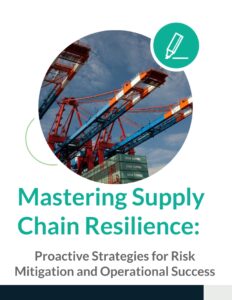Embracing Decentralization: Navigating the Complex Landscape of Chemical Processing with a Quality-First Approach
A quality focus is clearly dominating chemical processing organization, which needs to handle the internal and external complexity of chemical processing manufacturing and supply chain processes as well as the diversity of the business portfolio. It implies that a higher degree of business diversity as well as operations complexity suggests the utilization of a decentralized structure.
What do we mean by this? When a business starts to grow, the leaders may find that it is no longer feasible to continue making all the decisions. This is when decentralization can be beneficial. Decentralization is a type of organizational structure in which daily operations and decision-making responsibilities are delegated by top management to middle and lower-level managers because they are closer to the frontline than senior leadership. This frees up top management, or C-Suite leaders, to focus more on major decisions. While relinquishing control may be difficult for a business owner accustomed to making all the decisions, there are several advantages to decentralization. For example, decentralized businesses tend to be more agile and responsive to change. They can also make better use of local knowledge and expertise. In addition, decentralization can help to motivate and empower employees. As a result, it can be an effective way to manage a growing business.
Functional Structure The functional structure is the most common type of organizational structure used in businesses today. A functional structure is a hierarchy in which each level of the organization is responsible for a different function. For example, the marketing department may be responsible for creating advertisements, while the sales department is responsible for selling products. The advantage of a functional structure is that it allows businesses to specialize in different areas and to utilize the skills of their employees.
The disadvantage of a functional structure is that it can lead to silos within the organization, with each department working independently from each other. As businesses grow and enter new markets, they often need to decentralize their structure in order to be more agile and responsive to change.
A decentralized organization is one in which authority is distributed among different levels of the organization. The advantage of a decentralized organization is that it can make decisions more quickly and efficiently. The disadvantage of a decentralized organization is that it can be more difficult to manage and can lead to conflict between different departments. As an organization you must consider which structure will work best to align with your strategic goals and not follow what the industry has historically done. Innovation is key in this space.
Chemical processing complexity Higher chemical processing complexity often implies growth of a business and a larger portfolio, which requires professional resource management. Managing capacity with a view toward the fulfillment of customer expectations as well as efficient asset utilization is a complex task in the chemical value chain network. Ensuring smooth operational processes by preventing disruptions and minimizing downtime is essential to maintaining profitability in chemical processing. In order to achieve this, effective operations managers must have a deep understanding of both the technology and the business. They must be able to identify opportunities for improvement and then implement changes that will result in increased efficiency and productivity. By doing so, they can help their organizations to remain competitive in an ever-changing marketplace.
If you’re in an industry as technically difficult as hazardous chemicals, it’s fair to say that you know a thing or two about chemicals and what’s needed to produce a tangible product. Running a business is more than just producing a product; that applies tochemicals or otherwise.As a leader you may have found yourself focusing on the technical aspects of your business but have neglected the business side of the business. In many cases your operations are manualcausing you to hit a wall when it comes to scaling such a business and you now realize you may have failed to modernize?
It’s a tough shift to make, because you can’t just focus on efficiency and neglect safety and quality, given the consequences of getting it wrong. But it’s still possible to boost your efficiency — here’s how.
Improving business operations When it comes to product life cycle management, companies need to know products and services go through different stages, each with its own set of challenges and opportunities. In order to properly address these challenges and take advantage of these opportunities, companies need to implement a more sophisticated capacity management system. This system should be designed to lower and monitor an excess of resources, in order to prevent idle technical capacity. By taking these steps, companies can ensure that their products and services are properly managed throughout their life cycles.
As a chemical processing business, your needs are more complex and specific. From fire retardants, safe storage, and pallet racking requirements, there are many moving parts to the business, and they all must be done well if you want to succeed. In addition to running an efficient business, complex regulations require more oversight than firms in other sectors must contend with, which also aligns with how you run your business. There are four key aspects to pay attention to if your goal is to improve efficiency:
-
Process
-
Technology
-
People
-
Customer experience
Process You may have perfected the technical process in order to scale your chemical, but you will find it challenging to do so if you ignore the rest of the business. The processes that you may feel take a backseat to the technical aspect is where most leaders in your space go wrong. While your chemical is the business, and without it you may not have a business, there are less sexy aspects of business you must get right if you want to succeed.
For instance, raw materials, do you think you are maximizing your raw materials? How are you measuring waste? What about made to order specifications? What if we take on another component of the business such as maintaining your equipment, managing customer projects or something even less complicated like getting paid. It’s all part of your business, and is all required to run an effective, efficient business.
The best way to figure this out is to map out the processes involved in each of these areas. Once you know exactly what you’re doing on a daily basis and have some data to support the findings, it’s easier to identify where areas of opportunity lie. Could you shape up your processes by separating waste more carefully to reduce contamination or waste?
Technology
As touched on already, companies in the chemical processing industry tend to rely on manual processes. Do you find that you’re still using Excel for most of your operations?
If so, it’s time to shape up your processes. Technology is one of the best ways to scale your operations, allowing you to achieve more with fewer resources and less time. The use of Excel often results in confusion, especially if there are numerous people involved in your operations. This could be easily solved by a cloud technology solution that syncs across multiple computers.
Another thing to look at is the automation of your most basic tasks. For instance, you could set up automated alerts to remind staff about certain safety checks or equipment maintenance. Or even better, integrate sensors and use them to feed information to your software about exactly what can be found, where.
People It’s impossible to look at ways of shaping up your processes and operations without paying any attention to the people who are overseeing or participating in them. As you introduce new technologies or processes, you need to keep your team in the loop and train them on how to adapt.
Their roles may shift from inventory tracking to overseeing the technology that does this for them, which could then free them up for other areas, like carrying out continuous improvement.
Customer Experience This is one area where the danger of chemical operations affects very little. No matter what industry you’re in, you can use the latest and best methods to offer your customers the best service and experience possible.
Technology and processes can play a role in this. For instance, if you already have sensors tracking what items you have in your inventory and when they leave, they will pass on this info to software — meaning it can be sent on to customers.
Compliance
OSHA and EU-OSHA do a great job outlining safety and compliance requirements for domestic and international business. As a leader you must follow the required guidelines of the regulatory bodies, and ensure your business has the capability to be compliant with global regulatory bodies. This level of scale is only possible with seamless operation.
The examples outlined above are just an introduction of where you can improve your business by paying attention to your operations. At Cornerstone Paradigm Consulting, we’re a business operations consulting firm with experts across all sectors, including a consultant specializing in chemical process and materials industries. We can work together to figure out how to improve your business operations through people, processes, technology, and customer experience. Contact us to find out more. It can be tough to see the forest through the trees.







